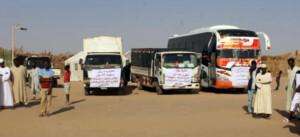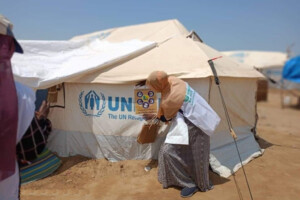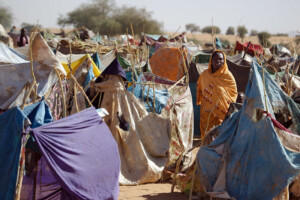Netherlands Ambassador to Sudan hails ‘fruitful and constructive’ meeting with TSC member El Hadi Idris
Member of the Transitional Sovereignty Council (TSC), El Hadi Idris, met at the Ambassador of Kingdom of the Netherlands to Sudan, Irma van Dueren, at the Republican Place in Khartoum on Monday. The meeting reviewed the historic relations linking Sudan and the Kingdom of the Netherlands in addition to aspects of joint cooperation between Khartoum and Amsterdam, according to the official Sudan News Agency (SUNA).
 Member of the Transitional Sovereignty Council (TSC), El Hadi Idris, met at the Ambassador of Kingdom of the Netherlands to Sudan, Irma van Dueren, at the Republican Place in Khartoum on Monday (Photo: SUNA)
Member of the Transitional Sovereignty Council (TSC), El Hadi Idris, met at the Ambassador of Kingdom of the Netherlands to Sudan, Irma van Dueren, at the Republican Place in Khartoum on Monday (Photo: SUNA)
Member of the Transitional Sovereignty Council (TSC), El Hadi Idris, met at the Ambassador of Kingdom of the Netherlands to Sudan, Irma van Dueren, at the Republican Place in Khartoum on Monday. The meeting reviewed the historic relations linking Sudan and the Kingdom of the Netherlands in addition to aspects of joint cooperation between Khartoum and Amsterdam, according to the official Sudan News Agency (SUNA).
During the meeting, Idris briefed the Dutch ambassador about the current political developments in the country, and the challenges facing the democratic transition process, referring to important role of the international community in supporting the transitional period.
In a press statement, Ambassador Van Deuren confirmed that the meeting discussed support of Kingdom of the Netherlands and the European Union to Sudan to overcome challenges of the political transition.
She pointed out that Sudan and Kingdom of the Netherlands are linked with good historic ties, describing the meeting as “fruitful and constructive”.
In an interview published on her official Dutch state website, Ambassador Van Deuren acknowledges that “Sudan is in transition and on a path to democratic elections, more rights for women, and establishing a democratic state governed by the rule of law. This is an important process and the Netherlands is eager to lend a helping hand.”
“A great deal can be achieved by sharing knowledge and bringing the right parties together. Especially in the area of food supply,” she says. “Economically, Sudan is in bad shape, but the IMF has cancelled a lot of the country’s debt. That offers possibilities. The country is building a democratic state governed by the rule of law. The Netherlands wants to make a contribution in all these areas.”
Van Duren cites food security as the most important issue in Sudan’s transition. “Democracy is great, but many Sudanese don’t know whether they and their families will be able to eat today or tomorrow. So food security is essential for the country’s stability,” she points out.
“We support farmers [in Sudan] by sharing expertise on new techniques and crops. Through other programmes, such as Orange Corners, we support women and young people who are starting their own businesses. We provide them with mentoring, for instance, in partnership with the Netherlands Enterprise Agency (RVO), other embassies and NGOs. We are also contributing to the establishment of a processing plant for gum arabic in Sudan. It’s a widely used raw material – it’s even an ingredient of liquorice [for which the Netherlands is famous – ed] – that has always been exported immediately after harvest. Setting up processing facilities in Sudan will create jobs.”

Women's rights
Prior to her appointment as Netherlands ambassador in September this year, Irma van Dueren worked with the United Nations in the area of sexual violence and women’s rights. Regarding the position of women in Sudan, she says “the change of power gives me hope. Certain laws are being changed, giving women more rights. In Khartoum there are clearly women who already have more freedom. The part they played in the uprising against the Al Bashir regime has empowered them. They want something in return.”
However Van Deuren laments that these is much still to be done I Sudan’s more rural areas. “There is a big difference between urban and rural areas. On March 8 I went to the east, near the Eritrean border, to visit the Beni Amir. I wanted to be there on International Women’s Day. In this remote area, women take care of everyone’s basic needs and they have very little autonomy. They provide food, drinking water and firewood. They take care of the family, educate the children and provide healthcare. But there is very little in the way of services and infrastructure. There is a lot to be done there and the Netherlands wants to make a contribution,” she concludes.











 and then
and then